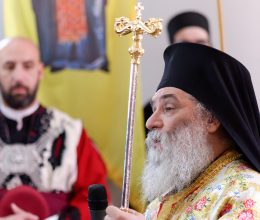Therefore, whosoever heareth these sayings of mine, and doeth them, I will liken him unto a wise man, which built his house upon a rock: And the rain descended, and the floods came, and the winds blew, and beat upon that house; and it fell not: for it was founded upon a rock. And every one that heareth these sayings of mine, and doeth them not, shall be likened unto a foolish man, which built his house upon the sand: And the rain descended, and the floods came, and the winds blew, and beat upon that house; and it fell: and great was the fall of it.
(Matthew 7:24-27)
One of the characteristics of the Divine image in man is his capability to create, to build, to invent. God is the supreme Poet, “Creator of everything visible and invisible”, consequently, man, as the perfect emanation of His creative force, also carries the capability of divine creativity. Therefore, man is a creative being, collaborator of God in the act of creation. Through the Divine Grace we create life, family, values, we build cities, societies, cultures.
We create, among other things, our identity as well. Here I have in mind the personal but also and above all our common, national identity, as a sum of individual equal identities. It’s important to denote that just like in any construction project, the creation of the national identity is determined greatly by the type of foundation, the material used and the method applied, which are all of vital importance for the outcome. Thus, when a building is constructed on unstable foundation with dubious statics and unsuitable, low-quality materials, it is doomed to crumble down one day and “great will be the fall of it”. In a similar way, the national identity constructed not on stone foundation (i.e., the historical truth and facts) but rather on “sand” (i.e., with falsification, distorting or covering up of facts, and selectivity in the historical past), is inevitably doomed to collapse.
No academic, nor anyone familiar with this matter could deny the fact that in the creative process of the modern Macedonian national identity (which is, certainly, the case with many other modern national identities, especially in the Balkans), many foundations and walls have unfortunately been built on sand. Any individual who is profoundly familiarised with the Macedonian historiography, who is anxious for the truth, knows just how much twisting and covering up of the facts, adding, falsifying, slandering, mythologizing, induced ideologies it is made of. He knows how many individuals from our past, originating from our territory and bloodline, with colossal spirit and thought, with impeccable reasonability and enlightenment, with deeds reaching the limits of human perfection, have been neglected, hidden, deleted from the historiographic papers and works, or have been marginalized somewhere in the dark background of our historical notions. How many others have been only partially presented or completely depersonalized, so that we have no real understanding whatsoever of their complete personality! And the question arises: Why is all that? Only and only because they had some other national identity, than the one we already have today, or would like to have? Because they were creators and constructors of some other close identity, beside ours; they were creators of some other statehood, beside ours?
And it is here, in the great closeness and mutual connection and intervening, where the endogenous psychological fear of disappearing, of non-existence, is hidden. The fear that if my ancestors were named different than me, my present name would disappear; that if I am too close to someone, my personality and originality would be gone. Or in other words, the fear that the other one is “stealing” my identity. But that is not so. Such closeness strengthens even further my uniqueness. Just like the offspring of certain parents, although it was conceived by their blood and body, can not be essentially equal to them, because it is already a separate unique person. Or like two brothers, who no matter how similar, are still two different individuals. Something similar happens in the field of national identity. The fact that, for instance, Goce Delchev and many other activists of ours (we take Goce as a suitable current example) have identified themselves as Bulgarians, doesn’t make me feel as a Bulgarian now, or less Macedonian. On the contrary, it strengthens even further my self-identification and makes me proud to be a descendant of such culture-enhancing nation. The covering up, hiding and twisting of historical facts can only lead to something unhealthy, uncertain and without future. “And ye shall know the truth, and the truth shall make you free.” (John 8:32). It is only with the truth that we can build true identity. An identity which will last and endure the winds and storms of the times to come.
The word identity comes from the Medieval Latin term identitas which, on the other hand, originates from the classical Latin pronoun idem – equal. I have identity – means that I have something equal, mutual with those who preceded me, with my ancestors. In order to have the spirit and the blessing of my ancestors, I need to respect the deeds they have left behind, their struggle, their feat, their self-identification. In order to preserve my modern identity, it is necessary for me to respect the identity of those before me, of whose body and blood and spirit I was born.
Archimandrite Parthenius,
with his brothers and sisters in Christ












